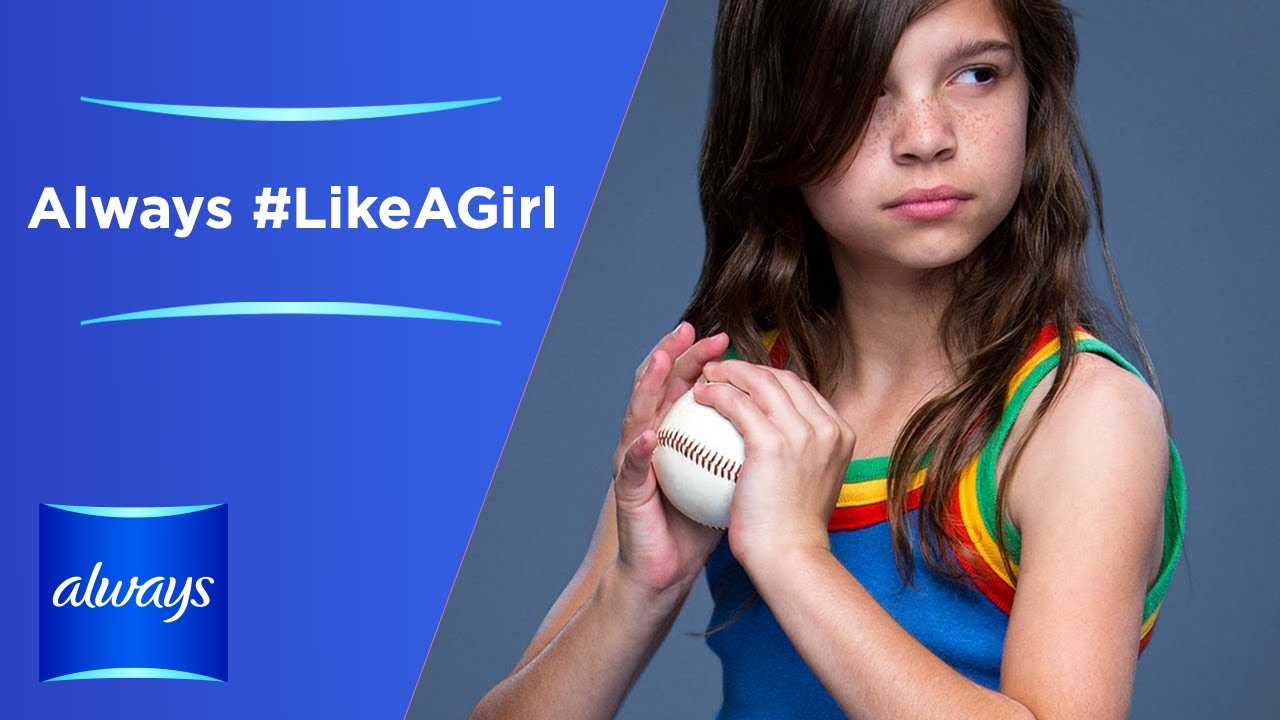Iconic Ads: Always – #Likeagirl

The loss in confidence by girls on attaining puberty along with a stereotypical attitude of what #likeagirl was shown in the Always film
It all began in the summer of 2013 at Cannes. Unilever’s social experiment with Dove had been a big success at the fest. Procter and Gamble had been thinking of taking the social consciousness route but Unilever was a step ahead. They came and took the awards.
Edgar Sandoval, the global head of the Always brand, assured Mark Pritchard, P & G’s chief brand officer, that P & G would win the honours at Cannes next year.
Edgar was so inspired that he wrote a brief for Leo Burnett on the plane on the way home. (Leo Burnett was the advertising agency for P & G)
P & G usually gave long briefs to its advertising agencies but this time Edgar gave a 2 sentence brief. Create a ‘Social by design’ advertising campaign that changes the world one girl at a time.
During adolescence, a girl’s self-esteem begins to decline, according to research. It was seen that girls the world over had amazing dreams about what they wanted to accomplish, but come puberty they started to lose confidence.
Always was a socially conscious brand that spent money on puberty related education. However, the brand has lost some of its lustre over time. It was an uncomfortable situation to be in since the brand was still respectable but was being known as a brand that my mother uses.
Always had taken a shot with the “Give the girl a break” campaign which was based on the insight that while women and girls have a reputation for undermining each other but they were predisposed to aid one another. That work had got positive feedback but it was not good enough
For months the teams worked on the brief that Edgar had given but nothing seemed to work. Finally, creative talent from various offices of Leo Burnett globally was brought in. Judy John from Leo Burnett Canada was brought in to lead the team. She was not very happy especially when the client said that he wanted the campaign as iconic as Apple and she thought that Edgar was crazy. It was not easy to create iconic campaigns. But she loved his ambition and he inspired her.
Teams from Chicago, Toronto, and London worked on the creatives. They were looking at how the media, school experiences, and even things that happen on the playground can all have an impact on young girls at such a sensitive period.
They had a massive whiteboard where they discussed how puberty affected girls’ self-esteem and what they can do about it. They had all of their ideas on display in a room one day.
The line #likeagirl was written on a piece of paper that Judy came across as she made her way through the maze. And something worked. It had her hooked. The line had an ironic ring to it.
They began discussing it and Judy asked the team, to work on ideas around this line. Many people, including women, had used the phrase before they even started talking about it. The variety of tales heard was shocking. It pricked a nerve.
Everyone had been asked to come up with ideas for the line by Judy. Members of the Leo Burnett team such as AJ Hassan recognised that this particular line had promise. It had now been a few weeks. AJ’s creative juices flowed at this point.
In her mind, she was sure that if adults were asked what it is to be #likeagirl, they would jump, dance and make fun of themselves. Also, she was aware that if she posed the same topic to a younger person, the responses and reactions would be different. From P & G’s research, it was seen that learned behaviour was being internalised until adolescence, demonstrating the lack of confidence when they reached puberty.
AJ’s idea was put to the test by several members of the creative team. They were dead-on in their predictions. The executives at P & G were blown away. They decided to move forward with the idea.
The next step was to choose a director who was capable of leading the effort. Leo Burnett wanted a director who had experience doing documentaries about women’s issues and who could get to the heart of the matter. In Lauren Greenfield, they found one. Gender stereotypes, sexist attitudes and the experiences of women were among the topics she had previously tackled. She was also a photographer and author of Girl Culture.
Surprisingly, Lauren didn’t grow up with the stereotypical burdens of being a girl. She was brought up in much the same manner as a boy by her parents.
She agreed but on one condition, it had to be real it would not be couched by advertising requirements/versions.
In her mind, she wanted it to be a scientific study. She was aware of commercials claiming to be documentaries but in reality, being propaganda.
It dawned on Lauren that the hashtag #likeagirl was true. When it came to acting like a girl, everyone was doing something offensive. Her children were also asked. Even though her 8-year-old didn’t understand what it meant, her 16-year-old played it out just like everyone else.
The casting process was intense and Lauren realised that even older women were set in their ways.
Live auditions, video submissions, and street casting were used in the project’s casting process. They travelled to many parks and engaged in conversation with others there, resulting in a wide variety of people.
She finally asked 250 people questions like crawl like a baby, walk like a grandpa, run like a girl etc.
In the summer of 2014, the #likeagirl video was published on YouTube. AJ was going on maternity leave, and even she did not expect what was going to happen.
Results
- 76 million views globally after 3 months (objective was 10 million);
- Most viewed video in P&G’s history; #2 most viral video globally
- 53% of reach amongst women 13-34 y.o. in the US
- +1,100 media placements;
- 4.4 billion global impressions earned in just 3 months
- 177,000 #LikeAGirl tweets in the first 3 months, including many celebrities;
- Always Twitter followers tripled in the first 3 months;
- Over 1 million shares by Day 28;
- Always YouTube Channel subscribers grew 4,339%!
- The engagement rate on Facebook was over 2x the target, at 2.25%;
- 35,000 people commented on the #LikeAGirl program in the first three months;
- 4,500 pieces of user-generated content were created in response to the CTA in the first three months;
- Ranked the most popular digital campaign of the Super Bowl.
The campaign swept the Cannes awards just like Edgar had wanted.



